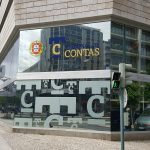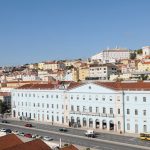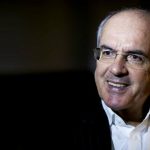Mário Centeno: Optimistic about recovery
There are good reasons to be cheerful for Mário Centeno who runs Portugal’s central bank – Banco de Portugal as the country’s economic recovery looks robust. However, there’s no time to rest on laurels.
Text and photos: Chris Graeme
Portugal’s economy is on track to register growth of 4.8% for 2021, company and private savings are at a all time high, banks are better capitalised, more robust and resilient than they have been for years and the downward trajectory of public and private debt seen in 2019 looks set to re-continue as the country emerges from the pandemic crisis. However, the Governor of the Bank of Portugal says there is no room to be lax or complacent when it comes to steering the ship of Portugal’s finances on a steady course.
Centeno addressed the American Chamber of Commerce in Portugal (AmCham) in October where his focus was on the Portuguese economy and Europe and during the important week when the minister of Finance, João Leão, delivered the State Budget 2022 to the Portuguese parliament.
It was also at a particularly important time personally for the governor who has served as Portugal’s minister of Finance (2015-2017) and headed the Eurogroup of EU Finance ministers (2017-2020) because he had the privilege, as a student of labour economics at Harvard Business School in the United States to be taught by one of this year’s Nobel Prize in Economics winners David Card who with Joshua Angrist and Guido Imbens won for their pioneering research that transformed widely held ideas about the labour force, showing how an increase in the minimum wage does not hinder hiring while immigrants do not lower wages for native-born workers.
Portugal faces very significant challenges of which the Governor of the Bank of Portugal highlights several which have an impact on financial stability and Portugal and its companies’ capacity to secure financing.
SAVINGS
For the first time in Portugal during a crisis period all private agencies succeeded in increasing their levels of savings. This includes not only families, but also, more unusually, companies. This has provided a leverage that Portugal did not have in previous crises to face recovery periods, but has also enabled Portugal to enjoy continuity in its recovery process.
But one of the mot important validations for the Portuguese government’s economic policy and performance has been the positive reactions from the ratings agencies. The upgrade in ratings began with the Portuguese Republic and was almost immediately followed by upgrades in Portugal’s financial system which “will surely set an ongoing trend if we continue to respond to challenges and get financing at reasonable terms which both the State and its companies rely on,” said Mário Centeno.
Euro Convergence and labour redeployment
For four years the Bank of Portugal’s policy has been one of continued convergence with the Euro Zone with a current growth of 3.5% contributing towards that goal which Centeno says is “essential and a challenge that Portugal must meet”. In fact, the Finance Ministry’s forecast for GDP recovery in 2022 should be at a level of 1.3% above that registered in 2019 (2.2%), enabling that return to convergence within the EU.
Within the European context in which Portugal’s finances have been boosted significantly with Next Generation EU funds — the funding of the Next Generation EU Agreement relying primarily on two financial mechanisms: the collective issuance of bonds and the revenue sources of the EU budget through which the EU and its member states seek to cover the whole budget expenditure of the recovery package — the two core pillars for investment action chosen are climate transition and the digitalisation process of European economies.
This goes from pre-school education to all the work and processes performed by companies and enterprises and the EU has provided a lot of financial resources. The governor of the BoP points out that in every economic crisis, even those which are not caused by structural problems, there is always a redeployment of resources and employment in economies.
Centeno admits the redeployment process in Portugal has yet to occur and will probably not wholly take place for two reasons: the policy measures for the crisis used to provide cashflow to companies and financial support which aimed to avoid variations in employment (i.e., redundancies) for those companies that were financially supported.
“This was absolutely essential to justify an economic and social support on such a scale, but equally important is that adapting them over the crisis cycle. This means fortunately that we are recovering growth and activity levels which are very close to the pre-crisis period,” says Mário Centeno.
“We will see a trend towards the structural convergence of the Portuguese economy as a result of the crisis and we must prepare the economy for a new structured growth trend. The growths of 5%, 10% and 3-4% we will see in the coming quarters will not end there and
Portugal will begin to grow in terms of values that are closer to a new structured growth trend”, he added.
Portugal’s GDP by the end of this year should be closer to that of Q4 2019 at 1.3%, while in terms of exports of goods it may rise above this percentage because in terms of investment Portugal was the European country which saw investment fall the least in 2020 (-2%), and even in the lockdowns investment hardly fell, although exports of services will be somewhat below pre-pandemic levels.
Confidence and predictability are essential for economic growth and investment and the Bank of Portugal has had the opportunity of seeing this daily with Portugal’s economic indicators reacting to government policy in an immediate and positive way. However, it was not positive for all sectors, specially catering, hospitality and tourism.
The economist is also convinced that Portugal’s decision to provide a much wider reach and for longer in terms of the moratoria than other EU member states was “the right decision”.
EXPORTS
In H2 2019/20 exports of goods were above those in H2 2019 with the trend continuing. Portugal managed to withstand the slowdown in international commercial trade in H2 of this year caused by industrial supply chain problems, and in recent months recovered exports — despite the slowdown in the automotive sector — in the other goods markets which more than compensated for this fall. “We are growing in recent months more than we were in the beginning of the year, while exports of services saw some improvement the start of Q2 2021 before falling back in Q3 but with a more significant and sustained recovery now which will continue on in 2022/3.”
But the most significant data for exports, and those to the US show this, is that Portugal is gaining market share. In the last half of the decade (2010-2020), more specifically between 2015-2018 there has been a trend to gain market share in exports with these market share gains continuing in the H1 of 2021. To June, Portuguese exports gained 1.8% in market share overall country-by-country and sector-by-sector, particularly in France and Spain. In terms of goods, increased market share is across the board. Exports to the US reflected these gains except in terms of tourism and travel.
LABOUR & SALARIES
In the labour market Portugal has faired well against other European Union member states. In Q2 of 2021 Portugal enjoyed the greatest labour market employment ever seen in the history of the Portuguese economy, far in excess of European levels, and while there has been a slight increase in unemployment, there has been greater employment in 2021 than in 2019, which in itself was a record year. However, there were 50,000 less jobs in H1 2021 in the accommodation, entertainments, bars and restaurant sectors, but more employment in construction, information technology and communications.
“Compared to the height of the last crisis in 2013, today we have 615,000 more jobs in the labour market in Portugal and the social and economic dynamic at this difficult time now has no parallel with what happened in the jobs market in 2011, 2012 and 2013,” says Mário Centeno. In fact all sectors in Portugal, even those to do with catering and hospitality, have more jobs than in 2013.
Salaries too have recovered significantly to close to where they had been before the pandemic. The first half of this year saw an increase in overall paid salaries of around 8% above the total salaries paid in H1 2019.
INFLATION
The Governor of the Bank of Portugal says that inflation is a phenomena that affects us all, which is why having a monetary policy is so vital for the confidence and expectations that financial and economic agents have in central banks and their capacity to control inflation.
Inflation has been rising since November 2020, largely due to the reopening of the economy which led to greater and pent up consumer demand and supply chain constraint (one only had to look at the 70km long queues of container ships trying to get into US ports in October to get the picture).
In June and again in July, the consumer price index or CPI rose by 5.3% on a year-on-year basis, marking the largest such increase since July 2008. You would have to go back to February 1991 to find a larger increase. Despite the US Fed suggesting this round of inflation will be transitory, some experts believe otherwise. While we cannot know with certainty how high inflation will rise or how long it will persist. So what does Mário Centeno think?
“All of the studies that we have show that (higher) inflation is temporary because at a European and Portugal level inflation is contained. We estimate an inflation level of 0.9% for the whole of 2021” with two completely different half years results: H1 with negative inflation and from Q2 with a significant acceleration in prices with the inflation rate climbing to 1.8%. (According to the INE In August and September it was 1.3%, in July 1.1% but in June it was -0.6%). In October 2020 it was -0,8%.
“What we are seeing with prices is actually what we had predicted in June and we are not being caught by surprise by the increases which at a European level are of a fiscal nature, particularly because of VAT increases in Germany and rising fuel prices after the price of crude was negative during the crisis, with the reverse happening in a very significant scale,” says Mário Centeno.
Again, Mário Centeno believes that the recent increase in fuel and electricity prices should be temporary, despite seeming to be, as he puts it— “currently out of control” and adds “studies at a European level suggest that the effects are temporary and of a fiscal (i.e., fuel duties) nature.”
PUBLIC ACCOUNTS
The Governor of the Bank of Portugal says Portugal’s debt — both public and private — have again begun to take a downward trajectory in a way that has not been seen in the past before the pandemic and by such a significant measure.
First, there had not been a single country in Europe between 2010 to 2019 which succeeded in reducing its private debt (families and companies) by such an amount and intensity as Portugal had.
Centeno says that a phenomena has taken place which had not been seen for many decades: Portugal in 2019 had a private debt in terms of percentage of GDP which was below the Euro Zone. Mário Centeno does say that Portugal has to reduce its ratio of public and private debt to GDP which is imperative for a country that still has very high debt levels nevertheless (accumulated total debt €762.4Bn) and which is why Portugal must have public accounts which enable ratings agencies like Moody’s to increase Portugal’s rating as it did this year. (Baa2 Stable)
“The crisis has obviously landed us with a bill, 80% of Portugal’s debt increase in 2020-2021 was public debt (20% private), so it is therefore very important that our public accounts retake a position of consolidation which will allow us to again continue to reduce the public debt to GDP ratio (it fell 4.3%) so that the interest rates on borrowing paid by the Portuguese republic do not return to levels we saw in the past (above 7% in 2011).
When looking at the primary current expenditure ratios in terms of percentage of GDP, between 2019 and 2021 (estimated) there is an increase of 1.8% (taking way all the effects on expenditure related to the Covid-19 pandemic).
“In the coming years we expect to return to levels of primary current account expenditure that will be close to the pre-pandemic crisis level and which will allow us to continue on the trend of debt reduction that we had in 2019,” stressed the former Eurogroup president.
THE BANKING SECTOR
Centeno says Portugal’s banking sector has been resilient and shown a fairly remarkable performance and posture throughout the crisis. One of the reasons it was able to do so was the reduction of risk which had taken place throughout the entire banking sector before the crisis. (the quality of its balance sheets, lower ratios of NPLs, increased capital ratios, improvements in cost ratios, the moratoria and the many support mechanisms from the ECB)
“There have been several billions of euros from Europe of which the Portuguese economy and banking system in Portugal used its share to reduce risk”, he says. (referring to bankruptcies and NPLs)
And continues “all of this has resulted in the evolution of the banking sector in terms of profitability – the banking sector did suffer during the crisis (but not as bad as in 2011-2015) — but had recovered in terms of profitability recovery rate levels by Q1 in 2021 compared to 2020”.
In fact, Portuguese banks held €92Bn of external guaranteed financial assets by Q2 of 2021 although the immediate exposure of Portuguese bank assets saw an increase of €5.2Bn compared to Q1 of 2021 according to the BoP.
There has been a sustained reduction in operational costs (much of it staff and branch closures) since the intervention of the ‘troika’ and an increase in efficiency (digitalisation) over the past years which is continuing. As to NPLs, by the end of 2020 the BoP recorded a total ratio of less than 5% for the banking sector which corresponded to the level of NPLs considered acceptable by the ECB and above which they would have to make more provisions.
“We have a level of NPLs below 5% with cover levels above the European average which is good and liquidity ratios for NPLs much closer to the Euro Zone average which has placed the Portuguese banking system in a completely different light,” Centeno explains.
And the economist points out that because of all the measures taken during the crisis in terms of the concession of credit guarantees by the State and the more robust position of the banks by the end of 2019, credit provided to companies have continued to grow in a robust way over 2020 and 2021 and flows of finance did not dry up in Portugal.
In conclusion, the Governor of the Bank of Portugal believes that Portugal and Europe’s economic policies should adapt to be able to ensure that the success enjoyed to date in dealing with the crisis is maintained.
“The crisis was unexpected and not structural and our policies towards companies was to ensure the greatest degree of stability possible for employment, salaries and company operations. These policies introduced to deal with the crisis, whether monetary, extraordinary financial support or budgetary, cannot stay in force forever and have to be adapted and staggered and not just vanish from one day to the next.
“They should be adapted throughout the crisis and it was much harder to take the decisions we took at the start of the crisis, and the measures we are taking now are easier because the economy is growing but more difficult because we have to work policies at a level of detail that was not necessary at the start of the crisis.”
But Mário Centeno is confident about the Portuguese economy. Savings have grown at a level never seen before in crisis periods, the banks have an important role in the financial intermediation process and all should cooperate and coordinate towards the successful exit from the crisis.










